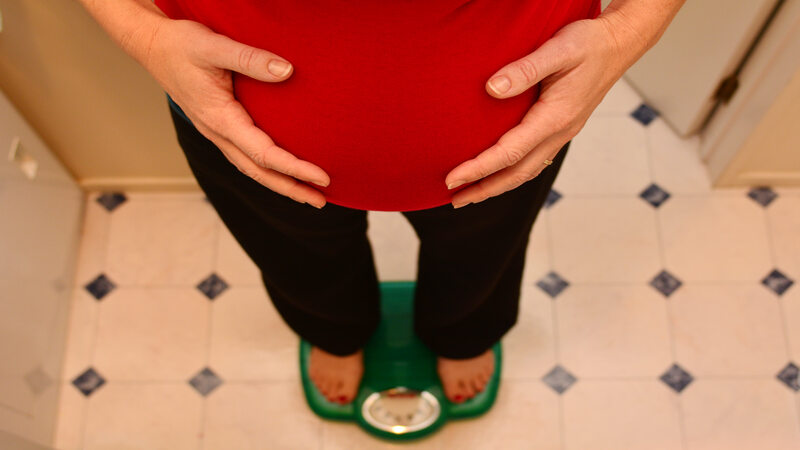 Do you know obesity can increase the risk of still birth and develop multiple health problems like hypertension and diabetes? Well, obesity is interlinked with pregnancy as it interferes with the normal ovulation process which might affect fertility.
Do you know obesity can increase the risk of still birth and develop multiple health problems like hypertension and diabetes? Well, obesity is interlinked with pregnancy as it interferes with the normal ovulation process which might affect fertility.
Research suggests that women with a BMI ≥30 had a stillbirth rate of 6.9/1000 total births. Moreover, with increased BMI, the success rate of IVF also decreases. To help you understand obesity, pregnancy complications and how to overcome the challenges, here’s we covered everything.
What Is Obesity?
Obesity is characterized as having surplus fat accumulated in your body. Obesity can increase your risks and can adversely affect the health and wellness of both mother and baby.
Whether a person is obese or not is determined by a formula involving height and weight- known s the BMI or body mass index, which is tabulated below:
| BMI Range | Weight Status |
|---|---|
| Less than 18.5 | Underweight |
| 18.5-24.9 | Normal |
| 25-29.9 | Overweight |
| 30 and more than 30 | Obese |
| 40 and higher | Extreme obesity |
It is therefore, vital to understand the complications associated with obesity and take positive steps to accentuate the chances of having a healthy baby.
Effects Of Obesity On Pregnancy
 Obesity can predispose a number of complications for you and your newborn. Here is a glimpse of what dangers obesity can have for you:
Obesity can predispose a number of complications for you and your newborn. Here is a glimpse of what dangers obesity can have for you:
- Gestational diabetes: Diabetes is more commonly seen in obese women and the one observed or developing during pregnancy is termed gestational diabetes
- Preeclampsia: Obesity women are also prone to have high blood pressure and high-risk complications of being overweight. Pre-eclampsia (PE) is a complication characterized by the presence of high blood pressure and the excess amount of protein excretion in urine
- Infection: It is seen that obese or overweight women are vulnerable to urinary tract infections. The threat of postpartum hemorrhage is also increased in fat women
- Overdue pregnancy: Delayed or overdue pregnancy is common in obese women. It implies that the pregnancy continues beyond the expected date of delivery
- Labor problems: Obesity also impedes the usage of pain medications like epidural block, etc. Labor induction is frequent in overweight women
- C-section: The probability of caesarean section increases in obese women as compared to normal weight women. Not only this, obesity also enhances your chances of getting C-section complications such as wound infection, delayed healing, etc.
- Pregnancy loss: As compared to normal weight women, obese women are more prone to miscarriages and subsequent pregnancy loss
An obese person has a BMI of 30 or more. Around 15-20 percent of expectant women fall under this category.
Effects Of Obesity On The Baby
Now, not only you, but obesity during pregnancy also poses risks to the fetus developing inside you, your baby. The below complications can arise for the baby of the mother is obese during pregnancy:
Risk of being born with a birth defect
Research indicates that babies born to obese mothers are at a higher risk of being born with birth defects such as neural tube defects
Heart Defect
Babies born to obese mothers are at 15% chances of being born with heart defects or conditions
Large Size
Obese mothers are more likely to give birth to bigger babies, thus increasing the risk of childhood obesity
The best and ideal way to protect your and your baby’s health is by shedding those oodles of accumulated fat.
Tips For Weight Control During Pregnancy

Here are some easy to do tips that will help you lose extra weight and at the same time will not affect your baby’s health:
- Balanced diet: Eat diet rich in carbohydrates, proteins, fats, minerals, proteins, etc. Do not skip food as it will affect your nutrition and will make you weak.
- Drink water: Water is vital for increasing your metabolism. Drink at least 10 to 12 glasses of water a day. It will keep your skin glowing, digestive system active and will hydrate you too!
- Regular exercise: Pregnant women should not do strenuous lengthy exercises. Light walking for 10 minutes is enough, but make sure you do it regularly and stringently
- Low sugars: Cut down on your sugar intake. If you still have a sweet tooth; eat your favorite sweet dish once a week and not too often
- Low fat: Avoid eating too oily and fatty stuff as it will only add to your calories and make you fat. Say no to butter, cream milk and ‘malai’. Use fat-free milk, curd or butter, if you can’t resist.
- No dieting: Some pregnant women start dieting in order to lose extra weight. But this is not advisable at all. It can result in serious harm to your tiny baby’s health. If you are experiencing morning sickness or nausea and vomiting in the first trimester, enjoying a balanced meal might be a tough task for you. You can take small frequent dry carbohydrates and drink plenty of water
- Increase Fiber: Eating starchy and high-fibre food is recommended as it not only satiates your appetite but also looks after you and your baby’s nutrition requirement
- Food supplements: Besides the diet there are some important food supplements that you should take according to your BMI
- Folic acid: Women having BMI of 30 or above should take 5 milligrams of folic acid daily and not the usual dose of 400 micrograms of folic acid. Folic acid should be taken in the first trimester of pregnancy as it aid in the development of your baby’s nervous system and its deficiency can lead to neural tube defects
- Vitamin D: This sunshine vitamin D is required for the healthy development of your baby’s bones and teeth. If your BMI is 30 or above, your doctor will recommend you to take 10 mcg of vitamin D because higher BMI means that you are deficient in this important vitamin
In a nutshell, having a healthy baby is an ultimate dream for a woman. Thus, by maintaining an ideal body weight you will be able to have a healthy pregnancy. However, before you plan to conceive with obesity, discuss with your obstetrician for right guidance.
FAQ’s
1. How Does Obesity Affect Pregnancy?
Obesity can increase the risk of pregnancy complications such as gestational diabetes, and preeclampsia (severe high blood pressure condition) and may result to stillbirth.
2. Is It Okay To Get Pregnant When Overweight?
Ideally, it is okay to get pregnant when overweight. However, it is advisable to achievea healthy weight or reduce some weight to avoid the risk of pregnancy complications.
3. At What Weight Are You Considered High-Risk Pregnancy?
Generally, women with higher Body Mass Index (BMI) of 30 or higher are considered as high-risk pregnancies.
4. How Can I Avoid Giving Birth To An Overweight Baby?
Technically, it is not possible to avoid the chance of giving birth to an overweight baby. However, you can reduce the risk by following a healthy lifestyle, a good nutrition diet, and managing obesity conditions.
